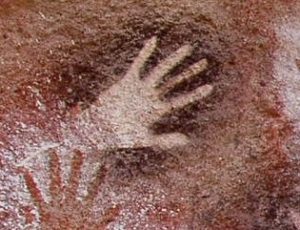 Ara killed my dog so I had to screw her man. His mouth was still swollen from the tooth he lost and he tasted terrible, but I did it anyway. I had to.
Ara killed my dog so I had to screw her man. His mouth was still swollen from the tooth he lost and he tasted terrible, but I did it anyway. I had to.
Afterward, tearfully, he told me a story about a boy from his part of the land who stole an arrowhead from a neighboring clan. They caught the boy and fed him white clay from the river until he exploded. Blood and bones and ropes of glossy pink organs everywhere. This was during the hard times when there was barely a weed to suck on, and no meat, not even a rat.
It was his grandfather’s arrowhead. He had to get it back.
Why would the clan destroy him for stealing an arrowhead when there was nothing to kill?
It wasn’t about the arrowhead, not to them.
Why are you telling me this?
Ara’s man didn’t reply, only shrank back and buried his face in his hands.
***
For the summer solstice feast, the men prepared two boars, both fat and gray. I’d led the kill for the second one and received the head meat according to custom. The stakeout took four days and I did not sleep at all. The first hunt without my dog, and it nearly killed me.
When the dancing began, Ara’s man came to me in the dark and rested his head in my lap. He had become even thinner, his cheekbones protruding like knuckles in a fist. He looked at my feet. I’m cold and haven’t eaten in five days.
Reluctantly, I threw him a chunk of meat wrapped in my pelt but forbade him from sharing it with Ara. I could have ended both of you, I reminded him.
The next afternoon, my knee-high child woke me. I had drunk too much mead and was still exhausted from the hunt. I stumbled out to the mouth of my cave and found Ara and her man. Her face was a mess. I never realized how ugly she was. I resisted the urge to punch her for coming into my territory and disturbing me.
She began to cry and yell, but I couldn’t understand a thing. Slow down you moron, I said, but in a low voice, so that it would soothe her.
She shook in frustration and emptied a large bag at my feet. A pile of bones, hoary and sharp, with their ends missing. She threw a pelt over the pile and pushed her man toward me. He was all sandpaper and sinew, like a dry old stick.
I shook my head. I don’t want him. Pitiful thing, really awful, the way he wept. Ara turned and walked off without a second glance. Her man swept the bones into the pelt and followed me into my cave.
***
The rains began and the valley bloomed. Food grew easier to find. I continued to miss my dog.
Lev, my mate, tolerated Ara’s man for longer than I expected. But one evening I returned to find Ara’s man by the praying rock with a rope of braided grass coiled around his neck and Lev’s hands bleeding. My youngest was screaming. Lev turned to Ara’s man and bared his teeth. Go find your own fucking cave.
Ara’s man looked at Lev, at me, then back to Lev. He looked at my son and paused, then gathered up his things and left.
Five days passed. I continued hunting. I climbed the hill to the viewpoint that overlooked our territory, hoping to spot Ara in the between-lands. She and her man once settled in the left-most edge of the cliff when they were thieving, after they tried and failed to beg their way into our clan. The cliff was smeared with a white substance, and I recalled the tale of the exploding boy, the one forced to eat clay. I kicked rocks loose and watched them form long lines of dust as they rolled downhill. I tossed arrowheads into the valley. Nothing moved. Ara’s man wouldn’t last long. Arrowheads were worthless without a bow.
The mesh of clouds suddenly yielded and lit up the valley. Sunbeams illuminated a figure stretched out among the tall grass, perhaps injured, perhaps sleeping. A bag of bones in the skin of a man. Beside him, a pelt.
A sensation overcame me that I did not know. Not quite like returning empty-handed from a hunt for the fifth sequential time, or the day I turned away from my wailing child when he reached for my breast. Not like the panic of a midnight raid when there is nothing to do but run. I wanted to leave but I could not, now that I had found him. I muttered to the spirits and searched the sky for signs.
What else could I do? I raised my bow and drew an arrow. I aimed for the head. And as I let go, I prayed that one day our species would find more than pity to resolve the suffering of our most luckless lot.
Min Han’s work has appeared in ZYZZYVA, The Holborn, Waccamaw, The Dudley Review and the anthology While We’re Here, among others. Born in Beijing, she grew up in Pennsylvania and California before spending her twenties in Africa and Asia with several development organizations. Considerably less footloose these days, she lives in Somerville, Massachusetts where she writes cases for the Harvard Business School by day and is at work on a novel.